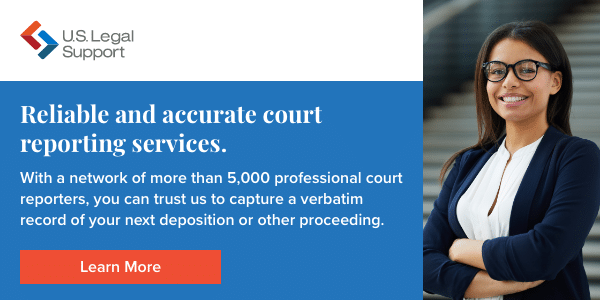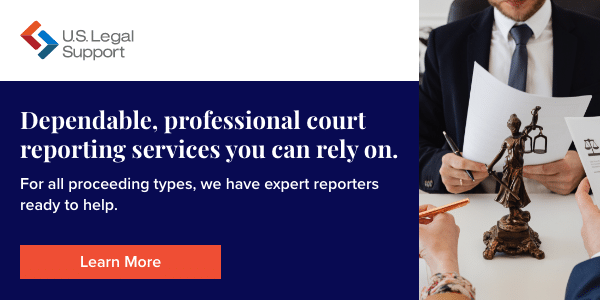9 Different Types of Legal Transcription Services

Legal transcription services provide an essential component for litigation by creating a written document from audio or video files which may play a crucial role in evidence for your case.
Legal transcription can be used far beyond the common hearings and trials, though. In fact, you can employ legal transcription services for a variety of law-related activities, from meetings to surveillance recordings.
Below we’ll take a look at the nine most common types of legal transcription, what they’re used for, and how they can benefit you in your legal practice.
How Does Legal Transcription Work?
Before understanding the different kinds of legal transcription, it’s important to know how transcription works in general.
Transcription is the process of converting spoken words and sounds to written text from an audio or video recording. Legal transcription, in particular, refers to:
- The practice of creating a transcript to capture exact words and sounds
- Services that require legal (vs. medical or general business) documentation
- Transcription from an audio file after the fact, vs. live or real-time transcription
Legal transcription is not to be confused with court reporting, which refers to capturing and converting live speech during a legal proceeding into a verbatim transcript by way of a Stenographer, Voice Writer, or Digital Reporter. Legal transcription, on the other hand, encompasses transcription from an audio or video file using traditional keyboard entry along with a foot pedal to play, pause, and rewind the recording to denote an accurately written representation of the file.
Importance of Legal Transcription Services
There’s no doubt that the use of audiovisual recordings at depositions and other legal proceedings has been a welcome jump forward, allowing the capture and sharing of original testimony that illustrates the demeanor and presentation of witnesses and evidence.
But there’s a reason you can’t submit an audio or video recording of a witness without an accompanying transcript at trial.1 The written transcript provides authoritative guidance on mumbled words, difficult-to-understand dialects, and unclear language.
Legal transcription services:
- Provide text files that can be indexed, searched, and extracted from
- Enable the sharing of case details across legal teams and involved parties
- Facilitate changes in counsel
- Provide basis for impeachment, appeals, and retrials
- Allow attorneys and paralegals to devote their time to strategic work
- Establish case files for future research related to academic or case law development
Types of Legal Transcription Services
At the start of a project assignment, a legal transcriptionist will identify specific needs of the service requested. Each of the following categories may require unique templates, formatting, abbreviations, or other style components.
See related: How to Become a Legal Transcriptionist
#1 Court Official Proceedings
You won’t find “Mr. Foreman, do you have the verdict?” in every legal transcript, but any court proceeding that takes place before a judge, jury, or magistrate requires a formal record. This includes:
- Grand juries
- Arraignments
- Preliminary hearings, court motions, and pre-trial motions
- Civil, criminal, and bankruptcy trials
- Post-trial motions, verdicts, judgment awards, and sentencings
- Appeals
Understanding the role of a legal transcriptionist vs. court reporter is also important. Court reporters often handle the transcription process as part of their original capture of speech by stenographic, voice writing, or digital means.
However, depending on jurisdiction regulations and practices, some proceedings are audio or video recorded without the presence of a court reporter. And in some legal systems, a court reporter captures the proceedings but only generates a written transcript upon request if one is purchased.
Legal transcription service may be needed if:
- A digital recording is the only available record
- Your legal team arranged for their own audio or video recording
#2 Depositions
If most of your exposure to our legal system is through TV shows, then you’d probably expect a courtroom to be the main setting of lawsuits and criminal cases. But the reality is that 94% of state felony convictions and 97% of federal criminal convictions are based on plea bargains, and 95% of civil lawsuits end in a pre-trial settlement.2,3
Depositions are critical to the negotiation and bargaining process. They serve to:
- Gather the sworn testimony of expert, eyewitness, character, and other witnesses
- Provide the opportunity for both sides to question a potential witness at length
- Be part of the official record if the legal case continues to completion
Similar to court proceedings, a written transcript is generated by an attending court reporter.
#3 Interrogations
A police or other official interrogation may be a precursor to a witness deposition. It’s an encounter that:
- May become critical to a legal case
- Requires professional, verbatim, and accurate transcription to capture all nuances
- Is typically audio or audiovisual recorded
#4 Emergency Calls
A 911 call transcript can be a critical piece of evidence in a criminal case or civil lawsuit. Legal transcription service provides a verbatim written record that captures every word and verbal sound.
This practice is important across the services described in this article, but particularly so with emergency calls that may later be analyzed for:
- What’s happening in the background
- The exact wording the caller uses
- How their vocalizing attests to their emotional state or honesty
Emergency calls are typically recorded, with some systems allowing for automated transcription drafts for reference. Legal transcription service is critical for 911 calls that are entered into evidence or used as a substantial part of the discovery or trial phases of a case.
#5 Wiretaps and Surveillance Recordings
Similar to 911 calls, audio and audiovisual surveillance recordings can yield thousands of hours of innocuous, irrelevant content before providing specific exchanges that become critical evidence.
As such, legal transcription of identified recordings is required to provide a text file that can be entered into evidence or used to impeach witnesses or negotiate pleas.
#6 Formal Meetings
Although the majority of legal transcription services are related to legal proceedings for attorneys and law firms, transcriptionists also convert audio to text for corporate entities, insurance adjusters, nonprofit, and governmental organizations.
Examples include:
- Meetings that are anticipated to impact lawsuits or legal actions
- Formal board of directors meetings
- Organizational meetings that require adherence to bylaws
- Public hearings related to critical issues or key funding decisions
- Meetings in preparation for ousting high-level executives or tenured academics
Legal transcription is a common business practice for many industries including energy, finance and banking, and insurance.
#7 Transcript Review
Legal transcriptionists may also consult or assist with drafted transcripts or partner with court reporters to review and finalize stenographically captured transcripts.
Legal transcription training provides the background not just to type what is heard on audio files, but to generate accurate and correctly crafted documents. This includes:
- Legal terminology, abbreviations, and common phrasing
- Familiarity with legal system processes
- Formatting legal transcripts and the use of correct templates
- Proofreading and style research
#8 Legal Dictation
Legal transcription is typically synonymous with strict verbatim transcription, but there are some instances where you don’t need to key in every cough or “um.”
Attorneys frequently rely on dictation to record case notes as well as memos and correspondence. A legal transcriptionist is best suited to correctly interpret the relevant abbreviations, style elements, and terminology.
Law firm employees who provide legal transcription can expect dictation assignments, but freelancers may also transcribe correspondence, notes, and memos, particularly those tied to a case or law firm they’re already on assignment with.
#9 Medico-Legal
Medical transcription is its own specialized field, primarily dealing with dictated notes from healthcare professionals. Some assignments, however, require a professional skilled in legal terms and medical terminology, regulations, and transcription. Examples include:
- Competency hearings to determine mental fitness
- Medical hearings to evaluate injuries, conditions, or physical or mental health
- Autopsies and forensic psychologist findings
- Independent medical evaluations (IMEs) for workers’ compensation claims
Medico-legal transcription may overlap with research and legal document analysis in addition to transcription, such as reviewing numerous medical records and notes to create a chronological history for a medical malpractice or other case involving a complex medical condition or injury.
Secure the Legal Transcription Service You Need
For nearly 30 years, U.S. Legal Support has provided comprehensive litigation support services including a full range of transcription services in the legal industry. No matter the type of audio or visual file you have, we can provide you with a skilled professional in the legal field to deliver a timely, verbatim written transcript.
Plus, you can work with us for other litigation support needs: we provide litigation consulting, record retrieval and analysis, interpreting and translation services, and more.
Reach out today to discuss your litigation support needs or secure transcription services.
Sources:
- Cornell Law School. Rule 32. Using Depositions in Court Proceedings. https://www.law.cornell.edu/rules/frcp/rule_32
- The Outline. Most criminal cases end in plea bargains, not trials. https://theoutline.com/post/2066/most-criminal-cases-end-in-plea-bargains-not-trials
- The Law Dictionary. What Percentage of Lawsuits Settle Before Trial? What Are Some Statistics on Personal Injury Settlements? https://thelawdictionary.org/article/what-percentage-of-lawsuits-settle-before-trial-what-are-some-statistics-on-personal-injury-settlements/

Editoral Policy
Content published on the U.S. Legal Support blog is reviewed by professionals in the legal and litigation support services field to help ensure accurate information. The information provided in this blog is for informational purposes only and should not be construed as legal advice for attorneys or clients.



